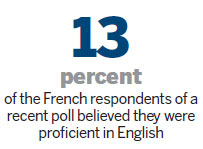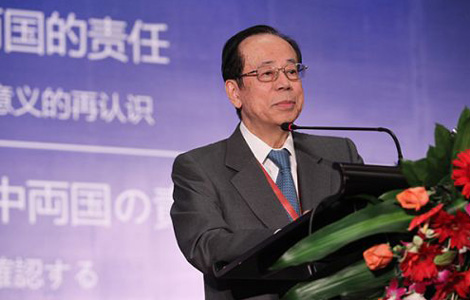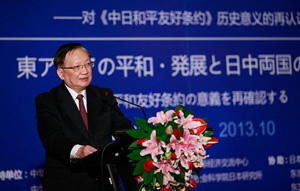English gains ground in Paris as globalization grows
Updated: 2013-10-28 07:04
By Li Xiang (China Daily USA)
|
||||||||
A recent survey found that the French are the second-most insecure people in Europe after Italy about their proficiency in English. Only 13 percent of the French respondents believed they are proficient in the language, according to the European data agency Eurostat.
The situation is no better in business circles, where three-quarters of French executives feel unprepared to hold an interview in English and only 16 percent say they feel comfortable with the language, a separate survey showed.
The survey results aren't surprising. The French seem to have always had this cold and gloomy attitude toward the English language. But what struck me is that, despite the French pessimism, living in Paris without being able to speak the language of Moliere is easier these days than in the past.
New immigrants are part of the reason. I can have an easy chat with the owner of the laundromat in my neighborhood. Buying the medicine I need at the local pharmacy is effortless. Ordering a meal in English at the restaurant two blocks away from my apartment does not make me feel awkward. It is all because the people who run these businesses are immigrants.

With the world becoming smaller and the economic interests of countries becoming so intertwined, immigrants and foreign cultures are pouring into the country. Boundaries are becoming less visible, and it is much harder for people to live an easy life by simply clinging to their own language.
Greater tolerance and acceptance of non-French speakers is a reflection of the fact that France, willingly or not, has begun to embrace globalization more comfortably. For instance, you will never get the same look you would have had 15 years ago if you ask for directions in English on the streets of Paris.
I have also met many native French who are happy to communicate in English. They are usually the kind of people who are open-minded and are sensitive to the changes beyond their own territories. They are very interested in gaining insight into what is happening on the other side of the globe.
In May, the French Parliament passed a law to allow university classes to be taught in English in an effort to boost the attractiveness of the country's universities. The opposition and the controversy it generated showed that the French are still struggling with their insecurity toward English, the invasion of Anglo-American culture and the sense of decline in terms of international influence.

In my hometown, English is also being hotly debated since Beijing education authorities decided to reduce the importance of English proficiency in college entrance exams and simultaneously increase that of the Chinese language and literature.
The Chinese and the French share similarities in attitudes toward foreign languages. We are both so proud of our own languages and cultures that we can feel uncomfortable when we are forced to communicate in another language.
But like it or not, English is still the most widely used language in the world, at least for the foreseeable future. For some occupations, it is a must-speak language. The Chinese people have realized this fact since the country's opening-up in the late 1970s.
After all, it is not about abandoning one's own language but about being able to fit more easily into this globalized world.
Contact the writer at lixiang@chinadaily.com.cn
(China Daily USA 10/28/2013 page10)

 Serena beats Li Na for WTA title
Serena beats Li Na for WTA title
 Nuclear submarine fleet comes of age
Nuclear submarine fleet comes of age
 5 pharmacies begin to sell baby formula
5 pharmacies begin to sell baby formula
 The suave style of America's dapper dynasty has arrived
The suave style of America's dapper dynasty has arrived Mother and four children stabbed to death in New York
Mother and four children stabbed to death in New York
 China Fashion Week S/S 2014: day 2
China Fashion Week S/S 2014: day 2
 Demonstrators protest against govt surveillance in US
Demonstrators protest against govt surveillance in US
 Where art thou, my love?
Where art thou, my love?
Most Viewed
Editor's Picks
|
|

|

|

|

|
Today's Top News
3 die after car crash at Tian'anmen Square
ABC apologizes for offensive words on Chinese
NQ Mobile hits back after US stock plunge
Jewelry exhibit dazzles Southern California
Obama aware of spying on Merkel: German paper
High speed versus history
States gear up for symposium
Cousin killed mom, 4 kids
US Weekly

|

|







